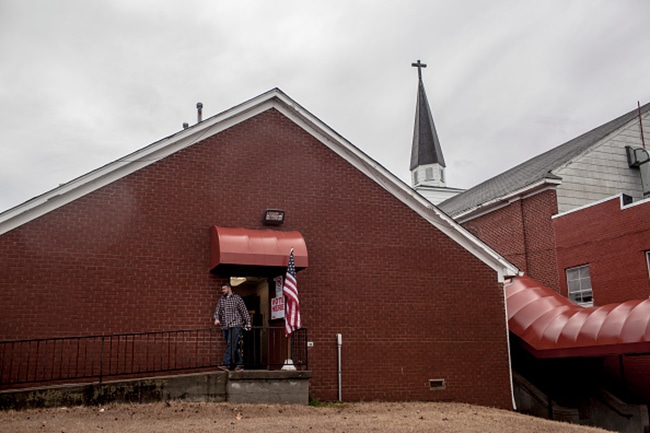
MEMPHIS, TN - MARCH 1: Voters trickle in and out of the Progressive Missionary Baptist polling location on March 1, 2016 in Memphis, Tennessee. Tennessee has 58 Republican delegates and 67 Democratic delegates at stake in their primary. (Photo by Andrea Morales/Getty Images) Image by Andrea Morales, © All Rights Reserved.
A Generation-Defining Speech by a Conservative Religious Leader That Is Good News for All
One of my frustrations in this presidential season has been the way good journalists have failed to look for nuance and substance in the religious response to the Trump candidacy. They’ve leapt to characterize a few endorsements by second-tier Evangelical leaders like Jerry Falwell, Jr. as a new Evangelical Republican coalition.
Meanwhile, they’ve virtually ignored the thoughtfully critical stance the Evangelical magazine Christianity Today has taken all along. All media aside from The Washington Post underplayed the resignation of Mark DeMoss from the Liberty University board of trustees in the wake of the early Falwell Jr. endorsement. DeMoss’s denunciation focused not on traditional “moral values” issues but on the tone the candidate was setting for public discourse:
“Donald Trump is the only candidate who has dealt almost exclusively in the politics of personal insult. The bullying tactics of personal insult have no defense — and certainly not for anyone who claims to be a follower of Christ.”
In my conversation with E.J. Dionne and David Brooks in last week’s show, we briefly discussed the post-Religious Right era of American politics that we are now in. Dionne has called for a “more capacious” sense of the role of religious people and voices in political life. Brooks is on a kind of mission with his observation that American culture has become “over-politicized and under-moralized.”
The truth is, there is a varied array of religious people and projects active in today’s public life — from Rev. Barber’s Moral Mondays movement to Sr. Simone’s Nuns on the Bus tours. But the religious voice is quieter overall, politically speaking, than it has been in decades. The conservative religious voice has seemed to fall into inarticulate disarray like the party it chose to follow in the bygone days of the Moral Majority and the Christian Coalition.
Until now.
On October 24, Russell Moore, who heads The Ethics & Religious Liberty Commission of the Southern Baptist Convention, delivered the 2016 Erasmus Lecture sponsored by the conservative magazine First Things. The subtitle of his speech was “Can the religious right be saved?” Really though, the address he gave is a vision not of survival but of acts better described in the language of faith: conversion, redemption, and new life. (The talk begins at the 16 minute mark.)
https://www.facebook.com/FirstThings/videos/10154248893799682/
To put Moore’s import into context, consider that the Southern Baptist Convention is the largest Protestant denomination in the United States. Moore’s role as president of The Ethics & Religious Liberty Commission makes him the official Southern Baptist voice to address social, moral, and ethical concerns. His predecessor, Richard Land, was a quintessential voice of the old Religious Right.
A piece by the always-interesting, intellectually rigorous conservative commentator Rod Dreher alerted me to Moore’s watershed remarks. The speech amounted to, he wrote, “a eulogy for the Religious Right, delivered by a conservative Southern Baptist who has had enough. I believe it will be seen as a generation-defining speech, a line in the sand between the Old Guard and the Next Generation, as well as a line in the sand marking the end of an era and the opening of a new one.”
Full disclosure: as readers and listeners of my work may know, I grew up Southern Baptist in Oklahoma. My beloved grandfather was a hellfire-and-brimstone preacher. But there was little talk of politics or voting, much less party affiliation, in the church of my childhood in the 1960s and ’70s. Russell Moore is a decade younger than I am, and he grew up in a hyper-politicized environment that left him disillusioned. He describes it this way in his Erasmus speech:
“And then there were the voter guides. A Religious Right activist group from Washington placed guides in our church’s vestibule, outlining the Christian position on issues. Even as a teenager, I could recognize that the issues chosen just happened to be the same as the talking points of the Republican National Committee. On many of these issues, there did seem to be a clear Christian position — on the abortion of unborn children, for instance, and on the need to stabilize families. But why was there a ‘Christian’ position on congressional term limits and a balanced budget amendment and the line item veto? Why was there no word for people in the historical shadow of Jim Crow on racial justice and unity? I was left with the increasingly cynical feeling — actually an existential threat to my entire sense of myself and the world — that Christianity was just a means to an end — a way to shore up southern honor culture, to mobilize voters for political allies, and a way to market products to a gullible audience. I was ready to escape — and I did.”
It is true in religious life, as in politics and every other human discipline, that change does not coalesce around external fault-finding, but around internal searching and correction. I, for one, feel respect for a vitality at the heart of the largest Protestant denomination in America as I read Russell Moore’s bracing analysis of the world to which he belongs. It is vastly more perceptive and substantive than any secular liberal denunciation I have read about Christians supporting Trump; those also often devolve into tactics of name-calling and insult which the same writers loathe in the candidate himself. Russell Moore rises far above the fray and above every simplistic stereotype of Christian conservatism as, for example, he declares:
“The crisis before us now is that of a national Religious Right political establishment that has waved away some of the most repugnant aspects of immorality — from calls for torture and war crimes to the embrace of an ‘alt-Right’ movement of white identity ethno-nationalists and anti-Semites to the kind of sexual degradation of women we could previously avoid by not choosing to listen to Howard Stern on the radio or the subscribe to Hustler magazine. Some of these — mostly evangelical — political leaders have waved away misogyny and sexually predatory language as ‘locker room talk’ or ‘macho’ behavior. Some have suggested that their candidate has never claimed to be ‘a choirboy’ — thereby defining deviancy down to such a degree that respect for women and respect for the vulnerable and respect for sexual morality is infantile and unrealistic. One said that his support for this candidate was never about shared values anyway. Others suggested that we need a strongman, and implied a strongman unencumbered by too many moral convictions, in order to fight the system and save Christians from a hostile culture.”
In another place Moore concludes:
“Mr. Trump did not give us this. This is a preexisting condition. The Religious Right turns out to be the people the Religious Right warned us about.”
Russell Moore’s personal trajectory of coming of age wary of toxic religiosity is not unlike that of the many people who answer “none” when asked about religious affiliation and are currently reshaping demographers’ views of religious America. But Moore’s escape was ultimately not to secularism, but to a re-envisioned orthodoxy.
I recognize the longing and hunger for depth that I see all around me and in our media space when Rod Dreher describes his version of this:
“There are more than a few younger Christians (and maybe a few older ones like me) who are ready for something new that is also something old and faithful. Nothing is fresher in the modern world than real orthodoxy.”
There are, to be clear, many ways in our century to investigate and discern and walk this path. I for one am intrigued and gladdened to see the Russell Moores and Rod Drehers of our world making the case for the depths of Christianity in our collective picture. We face many spiritual crises as we prepare to navigate the wreckage of this election after November. We need all the spiritual maturity and wisdom we can muster.

Share your reflection